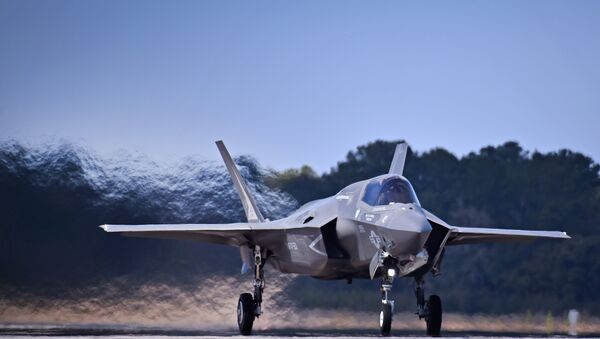Canada may not receive its fleet of F-35 fighter jets to replace the aging CF-18 Hornets, as the US is indicating dissatisfaction with competition rules imposed by Canada on potential bidders for the replacement programme, Richard Shimooka, a senior fellow at the Macdonald-Laurier Institute, wrote in an article, citing letters from US officials. According to him, the US believes that Ottawa is violating the rules that were set for states participating in the Joint Strike Fighter (JSF) programme for the F-35's development and production.
Namely, the JSF Program Executive Officer (PEO), Vice Admiral Mathias Winter, allegedly indicated in a letter to the Future Fighter Capability Office that Canada's demands that contractors follow the provisions of its Industrial and Technological Benefits (ITB) Policy are a breach of the restrictions set by the 2006 JSF Memorandum of Understanding.
The ITB policy, adopted in 2014, requires that foreign contractors with successful bids invest an amount of money equal to that of the contract in the Canadian economy. Considering the vast sums involved in military contracts, this is not something that suppliers can easily do. This approach was specifically banned in the JSF Memorandum, which was signed by Canada as a participant of the F-35 programme.
READ MORE: US Trade Office Predicts 76,000 Job Windfall From Trade Deal With Canada, Mexico
Shimooka further indicated that Ottawa's insistence on applying the ITB policy to eventual F-35 supplies might not only lead to the US not selling the jets to Canada, but also to the country's exclusion from the JSF programme for good, according to the letters. Vice Admiral Winter specifically indicated that merely participating in the JSF programme had already yielded major benefits to Canada, surpassing what it could obtain by applying the ITB, not to mention the discount on F-35s given to the country's air force.
"These benefits will extend well beyond the 15-year ITB obligation period […] As a Partner in the F-35 enterprise, Canada will continue to be eligible for best-value opportunities that span work on the entire F-35 fleet for the next 50 years", Winter reportedly wrote.
The lack of agreement between the US and Canada on the issue has reportedly led the government of Prime Minister Justin Trudeau to delay the decision as to how the $26 billion reserved for updating the country's fleet of aircraft will be spent, as well as which jets will be procured using these funds.
READ MORE: Trudeau Victory Threatens US F-35 Jet Deal With Canada
Neither American nor Canadian officials have commented on Shimooka's article so far.



